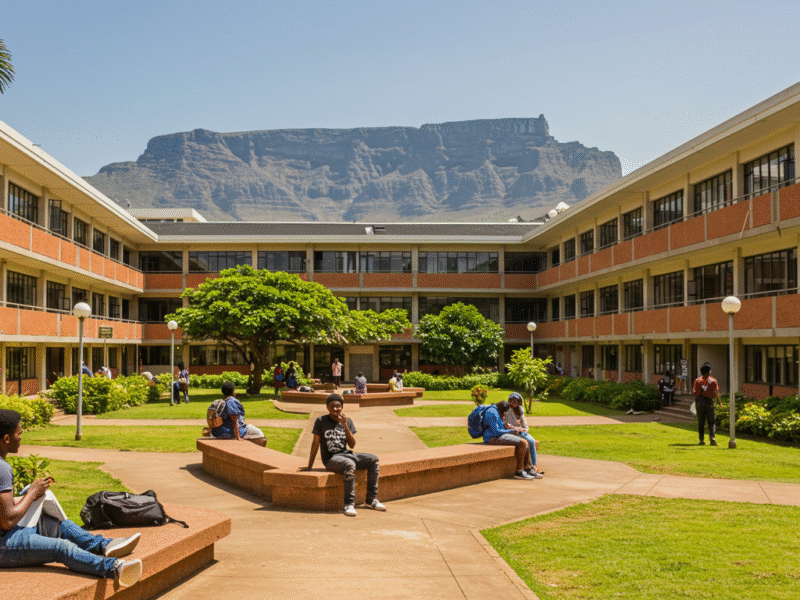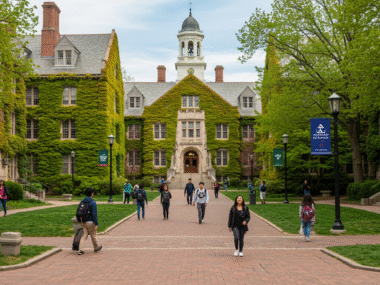Imagine stepping into a continent where ancient history meets cutting-edge innovation, and where your education could unfold against the backdrop of stunning savannas, bustling cities, and diverse cultures—that’s the magic of pursuing higher education at the best universities in Africa.
Also Read: Top Colleges in UK
Why Study in Africa?
When it comes to choosing a place to study, Africa often gets overlooked in favor of more traditional destinations like Europe or North America. But let me tell you, that’s a missed opportunity. This vast continent is home to some truly outstanding institutions that offer world-class education at a fraction of the cost you’d pay elsewhere. Whether you’re dreaming of a degree in engineering, medicine, business, or the arts, the top African universities provide programs that are not only rigorous but also deeply connected to real-world challenges. Think about it: studying here means immersing yourself in environments where issues like sustainable development, wildlife conservation, and technological advancement are part of everyday life.
Affordable Education with Global Impact
One of the biggest draws for international students is the affordability factor. Tuition fees at many of the best universities in Africa are significantly lower compared to those in the US or UK, making higher education accessible without drowning in debt. For instance, you could earn a bachelor’s degree for under $5,000 per year in some cases, including living expenses. And don’t forget the scholarships—many institutions offer generous funding for both local and foreign students, especially in fields like STEM or public health.
Unique Learning Opportunities
Beyond the classroom, studying in Africa builds character in ways you might not expect. You’ll learn to adapt to new cultures, languages, and perspectives, which is invaluable in today’s interconnected world. The continent’s diversity—over 3,000 ethnic groups and more than 2,000 languages—means your classmates could come from all corners of Africa and beyond, fostering lifelong friendships and a global network.
Safety and Lifestyle
Safety concerns? While it’s smart to research specific areas, many top campuses are in secure, vibrant cities with modern facilities. And the natural beauty? From Table Mountain overlooking Cape Town to the pyramids near Cairo, your weekends could be filled with adventures that make your Instagram feed pop.
How We Rank the Best Universities
Now, if you’re wondering how we determine the “best” universities, it’s all about reliable rankings from sources like Times Higher Education, QS World University Rankings, and EduRank. These organizations look at factors such as academic reputation, research impact, employer reputation, faculty-to-student ratios, and international diversity. For Africa specifically, the focus often includes how institutions contribute to regional development, like addressing climate change or economic inequality.
Top Universities in Africa
University of Cape Town (UCT), South Africa
Overview
Starting with the undisputed leader: the University of Cape Town (UCT) in South Africa. Founded in 1829, UCT sits at the foot of Table Mountain, offering breathtaking views that alone make it worth considering. It’s consistently ranked as the number one university in Africa across multiple metrics. With over 29,000 students, including a healthy mix of internationals, UCT excels in fields like medicine, law, and environmental sciences.
Academic Excellence
Their medical school is renowned for groundbreaking research on HIV/AIDS and tuberculosis, diseases that have shaped global health discussions. UCT’s commitment to social justice, born out of South Africa’s complex history, promotes inclusivity through programs addressing inequality. Their partnerships with organizations like the World Health Organization mean you could be part of studies that influence policy worldwide.
Campus Life and Admissions
Campus life here is electric—think student societies ranging from debate clubs to hiking groups, and facilities like state-of-the-art labs and libraries stocked with rare African manuscripts. Admission isn’t a walk in the park; you’ll need strong high school grades, especially in math and sciences for STEM programs, and possibly an entrance exam. International students should budget around $4,000 to $6,000 for tuition annually, plus living costs of about $8,000 in Cape Town. Scholarships, like the Mastercard Foundation Scholars Program, cover everything for talented African youth.
University of the Witwatersrand (Wits), South Africa
Overview
Moving on to the University of the Witwatersrand, or Wits as locals call it, also in South Africa. Located in Johannesburg, the economic heartbeat of Africa, Wits has been around since 1896 and boasts a reputation for producing leaders—think Nobel laureates like Nelson Mandela, who studied law here. It’s ranked second in Africa.
Academic Strengths
Wits excels in mining engineering (fitting, given Joburg’s gold rush history), business, and archaeology. Their Wits Business School offers MBAs that focus on African markets, preparing you for roles in emerging economies. Their medical research on pandemics has been pivotal, especially post-COVID.
Student Experience
The campus spans 400 hectares, with modern buildings interspersed with green spaces where students chill between lectures. Student life includes vibrant arts scenes—drama, music, and film festivals are common—and sports teams that compete nationally. Admission requires good grades, SAT or equivalent scores for internationals, and sometimes interviews. Fees hover around $3,500 to $5,000 per year, with scholarships available through the university’s endowment funds. Alumni are everywhere, from CEOs to influential politicians.
Stellenbosch University, South Africa
Overview
Next up is Stellenbosch University, another South African gem nestled in the wine country of the Western Cape. Established in 1918, it’s known for its picturesque campus with Dutch colonial architecture and surrounding vineyards—perfect for a study break with a glass of local vino (responsibly, of course). Ranked third in Africa.
Academic Focus
Stellenbosch shines in agriculture, viticulture (that’s wine science), and engineering. Their programs in renewable energy and biodiversity conservation are top-notch, often involving fieldwork in nearby nature reserves. The Institute for Wine Biotechnology is a standout for research.
Campus and Admissions
With about 32,000 students, it has a strong international presence. Campus facilities include cutting-edge research centers and a lively student union with over 100 clubs. Admission criteria emphasize academic excellence, with portfolios required for creative fields. Tuition is affordable at $3,000 to $4,500 yearly, with bursaries for underprivileged students. Notable alumni include tech entrepreneurs and winemakers who’ve gone global.
Cairo University, Egypt
Overview
Shifting north to Egypt, Cairo University stands out as a powerhouse. Founded in 1908, it’s one of the oldest in Africa and ranks highly, often in the top five continent-wide. Located in Giza, near the pyramids, it enrolls over 200,000 students.
Academic Strengths
Cairo University’s medical faculty is legendary, with hospitals that serve millions and conduct research on tropical diseases. Their programs in engineering and Arabic studies are perfect for those interested in Middle Eastern affairs or ancient history.
Student Life and Costs
The campus blends modern and historic elements, with libraries holding priceless manuscripts. Student life involves cultural events, like poetry readings and Nile boat trips. Admission is competitive, based on national exams for locals and equivalency tests for internationals. Fees are incredibly low, around $1,000 to $2,000 per year, with government subsidies. Scholarships from organizations like the African Union are common.
American University in Cairo (AUC), Egypt
Overview
In the same country, the American University in Cairo (AUC) offers a Western-style education. Established in 1919, it’s private and ranks well for liberal arts and business programs. With a smaller student body of about 7,000, it provides personalized attention in a stunning New Cairo campus.
Academic Programs
AUC is great for international relations and media studies, given Egypt’s geopolitical role. They emphasize critical thinking and have exchange programs with US universities.
Campus and Admissions
Campus vibes are cosmopolitan, with cafes, theaters, and sports complexes. Admission requires strong academics, essays, and possibly TOEFL scores. Tuition is higher, at $20,000+ annually, but scholarships cover up to full rides for merits. Alumni include diplomats and filmmakers.
University of Nairobi, Kenya
Overview
Heading to East Africa, the University of Nairobi in Kenya is a standout. Founded in 1956, it’s the oldest in the country and ranks in the top 10 Africa-wide. With 84,000 students, it’s massive.
Academic Excellence
It excels in law, veterinary science, and information technology—key for Kenya’s tech boom, often called “Silicon Savannah.” Research on wildlife and agriculture addresses local needs, like combating drought.
Student Life
Campus life includes vibrant markets, sports events, and innovation hubs where students launch startups. Admission is via national exams or equivalents, with fees around $1,500 to $3,000 yearly. Scholarships from bodies like the World Bank support many. Famous grads include environmental activists and tech pioneers.
Makerere University, Uganda
Overview
In Uganda, Makerere University is a historic institution dating back to 1922. Ranked highly, it specializes in public health, agriculture, and social sciences.
Research and Impact
Makerere’s role in Ebola research has been crucial. The Kampala campus is green and welcoming, with over 35,000 students.
Campus Experience
Student activities range from cultural festivals to entrepreneurship clubs. Admission needs good grades; fees are low at $1,000-$2,500. Scholarships abound for regional students.
University of Ibadan, Nigeria
Overview
Nigeria’s University of Ibadan, founded in 1948, is West Africa’s pride. Top-ranked in the region, it shines in pharmacy, literature, and engineering.
Academic Strengths
Research focuses on tropical medicine and African literature. With 33,000 students, the Ibadan campus features colonial-era buildings and modern facilities.
Student Life
Campus life includes debates, music, and sports. Admission via UTME exams; fees $500-$1,500. Alumni include Nobel winner Wole Soyinka.
University of Lagos (UNILAG), Nigeria
Overview
The University of Lagos, established in 1962, is another Nigerian star. Known for business and marine sciences, it’s urban and dynamic with 57,000 students.
Programs and Innovation
UNILAG’s entrepreneurship programs foster startups. Facilities include lagoonside labs. Admission competitive; fees low.
Alumni Impact
Grads excel in finance and tech.
Mohammed V University, Morocco
Overview
In Morocco, Mohammed V University in Rabat, founded in 1957, ranks well for Islamic studies and engineering. With 80,000 students, it’s a cultural melting pot.
Academic Focus
Programs emphasize North African history. Campus includes mosques and gardens.
Costs and Admissions
Fees affordable; scholarships available.
University of Ghana, Legon
Overview
Ghana’s University of Ghana, from 1948, excels in humanities and health. With 40,000 students, it’s a research hub for malaria.
Campus Life
Vibrant campus with festivals. Low fees; alumni like presidents.
University of Dar es Salaam, Tanzania
Overview
Tanzania’s University of Dar es Salaam, 1961, is strong in marine biology and economics.
Addis Ababa University, Ethiopia
Overview
Ethiopia’s Addis Ababa University, 1950, focuses on agriculture and law.
University of Algiers, Algeria
Overview
Algeria’s University of Algiers, with ancient roots, excels in medicine and sciences.
University of Tunis El Manar, Tunisia
Overview
Tunisia’s University of Tunis El Manar is strong in engineering and IT.
Regional Strengths and Trends
South Africa dominates due to funding and infrastructure, but North and East Africa are rising.
Benefits of Studying in Africa
Why study here? Advantages include cultural immersion, affordable costs, unique research, and career boosts in growing markets. You’ll gain global perspectives, resilience, and networks.
Ranking Criteria Explained
Ranking criteria include research output (30-40%), teaching quality, international outlook, and industry income.
The Future of African Higher Education
The future looks bright with more collaborations, online learning, and a focus on Sustainable Development Goals.
Conclusion
In conclusion, Africa’s best universities offer transformative experiences. Ready to explore?
For more details, check out the Times Higher Education Africa Rankings or QS Top Universities in Africa.











